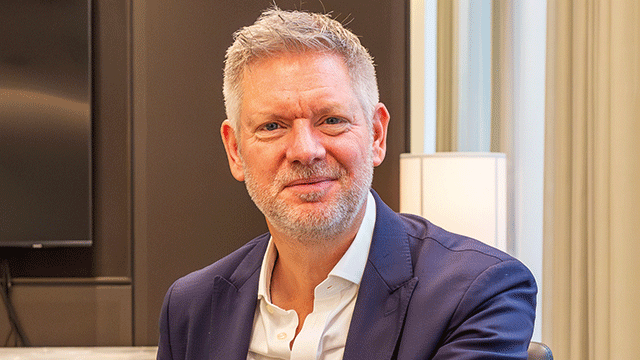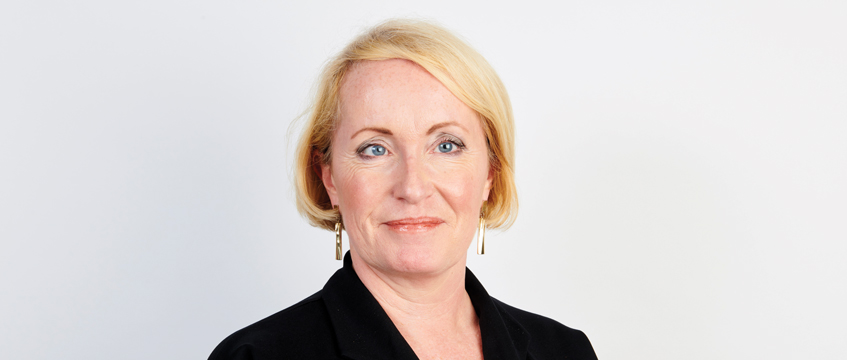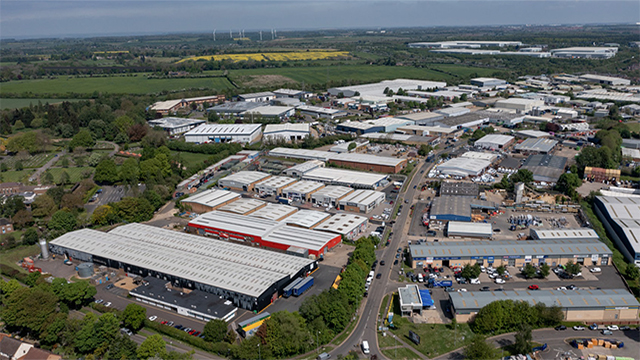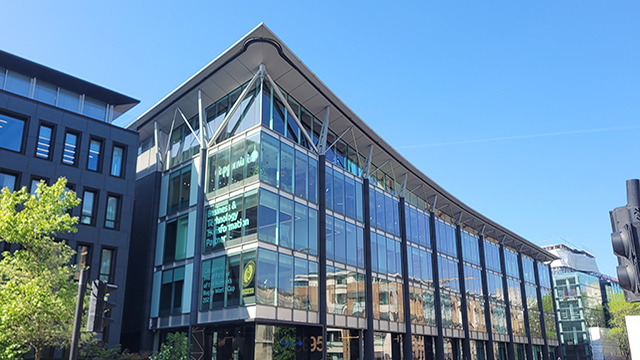The EG Interview: L&Q’s Fiona Fletcher-Smith on being different
When Fiona Fletcher-Smith declares mid-interview “I am not a token anymore” she could be referencing one of several scenarios. But it is not her promotion to group chief executive at housing association L&Q. Nor is she berating the industry’s support for women or immigrants in the UK, as she has in the past.
Rather, she is highlighting diversity at industry conferences and on panels, where she believes women’s voices now stand out and can play an instrumental and inspirational role.
“We have a real leadership role in the industry,” Fletcher-Smith says. “Conference organisers are now taking us seriously when we say ‘I don’t want to be the only woman on the panel. I am not a token anymore, I am here in my own right, I’ve got a lot to say, and here is a list of other women I know.”
When Fiona Fletcher-Smith declares mid-interview “I am not a token anymore” she could be referencing one of several scenarios. But it is not her promotion to group chief executive at housing association L&Q. Nor is she berating the industry’s support for women or immigrants in the UK, as she has in the past.
Rather, she is highlighting diversity at industry conferences and on panels, where she believes women’s voices now stand out and can play an instrumental and inspirational role.
“We have a real leadership role in the industry,” Fletcher-Smith says. “Conference organisers are now taking us seriously when we say ‘I don’t want to be the only woman on the panel. I am not a token anymore, I am here in my own right, I’ve got a lot to say, and here is a list of other women I know.”
Fletcher-Smith knows all too well that women have often found themselves in the spotlight at such events – for the wrong reasons. She was singled out in 2019 on an industry panel when she criticised reliance on housing association cross-subsidies. “Because I was the woman in the room, I had the louder voice,” she says. “I was merely repeating what [social housing leader] Lord Best had said.”
In her new role, Fletcher-Smith arguably has a louder voice than ever. And she is adamant that as she steps into the C-suite at L&Q she will embrace her responsibilities and use that voice for good.
“I am an immigrant to the country. I’m a woman in the development and construction industry. I’m a woman leading a multi-billion-pound business. I’m a role model,” she says.
This, Fletcher-Smith believes, is how you really start to change the industry. “We’ve got to walk the talk. There’s a lot of talking in property, not a lot of walking.”
Shovels and ladders
Before joining L&Q as development director in 2018, Fletcher-Smith spent 25 years working for local and regional government. She went from Westminster to Lambeth, then to Hammersmith & Fulham and Hackney before working for 12 years at the Greater London Authority.
“The public sector has really tried hard and has cracked some of the glass ceilings for women and for minority colleagues,” she says, but adds: “We [in the private sector] have a lot more to do on this.”
Fletcher-Smith has faced her own challenges. “It’s been harder being Irish,” she says. “There is a stereotype that the Irish person involved in construction is the guy called Paddy leaning on a shovel. There’s a lot more to construction, and there are a lot more women in positions of power who have an Irish background.”
Fletcher-Smith knows “how it feels to be an immigrant in Britain” and wants to use her new profile to raise awareness. At L&Q, this will shape the work to find a replacement development director. But how do you push that across the wider industry?
“Well, you start with appointing women to chief executive roles, you start with appointing BAME people to boards,” she says. From there, she adds, professionals at the top have the opportunity to empower others. “I’ve no intention of pulling up any ladders now that I’m here. I’m still continuing my mentoring of young women in this organisation and others.”
A broader range of backgrounds and experiences can only strengthen businesses, she says. “Cognitive diversity really fascinates me. I want that right across L&Q. Everybody matters and that difference really matters to decision-making.
“If we are doing a project, say, on the South Kilburn Estate and I have people around the table who have grown up on dense, inner-city housing estates, they will have a much better, more interesting idea about how places can work than if you are brought up in a leafy mansion in Surrey.”
Out of the comfort zone
Being different has also worked in Fletcher-Smith’s favour. “One of the things that surprised me when [then-chief executive] David Montague rang me about becoming development director was that he was interested in the breadth of my experience, as opposed to just my narrow focus on development.”
This is her main piece of advice to people working their way up: “Do different things. Don’t be obsessed with a linear ladder.”
For Fletcher-Smith, this has seen her implementing an IT system (“I knew nothing about IT”) at a small housing association and collecting rubbish in Hackney. She tells the story of a hot July morning in the early noughties, donning her street sweeping gear to join the council’s refuse service.
“We were about to commission a new fleet of refuse trucks and I wanted to know what it was like in the old ones before signing off the specification,” she says. A trip around Stamford Hill’s fish shops quickly told her that the £1m bill for air conditioning in the truck was worth the spend for more effective employees.
“You bring so much back with you, that cognitive diversity from doing lots of different things,” she adds. “Don’t just focus on your bit of the business. Ask questions about everything that is going on. I think if we had been a bit more curious about a few more things in the past, some of the things around fire safety wouldn’t be where they are.”
That curiosity is one attribute Fletcher-Smith says she shares with her predecessor, despite Montague’s finance focus contrasting with her own construction background.
Building back
There is irony in L&Q appointing a development professional to lead the business as it turns its focus away from new land acquisitions. A drop in market sales saw overall completions drop by 10% last quarter and L&Q has warned that the pace of new development will slow in the short term.
But as Fletcher-Smith takes the helm, regeneration means more than producing new homes, and L&Q is shifting its focus to existing estates. “The big priority for us is around the safety of our residents and the existing stock,” she says. “It isn’t that we are going to stop building in any way.”
Pipeline partnerships are still coming through – in just the last month, L&Q signed two deals, teaming up with Hill Group for the 8,500-home Westerley Green garden town and with FEC to deliver affordable homes at the £1bn Northern Gateway in Manchester.
Private sale and “capital-intensive” private rent will slow in the short term, although social housing is still a focus. L&Q has a commitment to 50% affordable housing on all schemes and aims for 50% of that to be rented affordable. “That’s not always easy, because we do rely on subsidy, either from ourselves or government funding,” says Fletcher-Smith. “Subsidy from ourselves is harder because we want to focus on safety and investing in our own stock. That’s why we will be focusing on the existing pipeline and investing in our own stock.”
In the past, all profit would be funnelled back into new development, but today L&Q has committed to £250m in building remediation and fire safety measures – more than its entire surplus projection for this quarter.
“The problem is we don’t know the full bill yet because we are still surveying,” Fletcher-Smith adds.
The housing association will benefit from the £5bn in government grants to support remediation where necessary of its 200 buildings over 18m tall, but it has 2,700 buildings under that height to investigate.
Creative thinking
Fletcher-Smith acknowledges that secretary of state Robert Jenrick has recognised that the capital required to fix safety problems could mean a setback for two other industry priorities.
“One of them is new development and the other our climate action programme,” she adds. “If people can recognise there is only one pot of money, we can then look at more creative and imaginative ways to generate [funds].”
Fletcher-Smith suggests exploring the relationship between genuinely affordable housing provision and GDP uplifts to make the argument for greater government grants as an example.
But it’s not all about the money. “There is more to what happened at Grenfell than simply the story of the cladding and the fire safety,” she says. “It is about things like the stigma of social housing and how landlords treat their residents, and it wasn’t good enough.”
She admits the industry has a “paternalistic” habit when it comes to residents – “As in, we’re the experts, we’re chartered surveyors, we know best. Frankly, it is rubbish.” L&Q group board member and resident Fayann Simpson OBE recently launched a residents’ engagement panel to contribute ideas on improving the estates, looking at a range of issues including climate change and biodiversity.
That’s what Fletcher-Smith really wants to see: collaboration with residents and industry partners. Despite all the claims of slowing in the short term, she excitedly lists those developers she would like to do more with. There’s Hill, Mount Anvil, SMEs via the Build London Partnership and new partners too, and she is keen to get back out meeting people and working together.
“I am always curious about other businesses – how we can support each other. We learn an awful lot in sales, marketing, construction and planning,” she adds. “We are not that interested in section 106. We want something that is a bit more meeting of equals than simply buying section 106 stock. That was never really L&Q’s style.”
To send feedback, e-mail emma.rosser@egi.co.uk or tweet @EmmaARosser or @estatesgazette
Picture © L&Q











